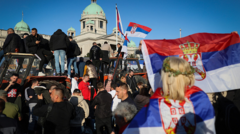In Belgrade, a pro-government rally draws tens of thousands, contrasting sharply with recent widespread protests against the administration.
Thousands Rally in Support of Serbian President Vucic Amid Ongoing Tensions

Thousands Rally in Support of Serbian President Vucic Amid Ongoing Tensions
Pro-Administration Demonstration Highlights Diverging Public Sentiments in Serbia
Tens of thousands of supporters converged in Belgrade this weekend to rally behind Serbian President Aleksandar Vucic. This enthusiastic turnout follows several months of escalating discontent across the nation, culminating in numerous protests sparked by a tragic railway accident last November. An independent monitoring group estimated that around 55,000 attendees gathered outside the National Assembly, a turnout that, despite some Vucic supporters traveling from neighboring regions, significantly lagged behind the massive anti-government demonstrations of the previous month.
The backdrop for the rally stems from a devastating incident when a railway station canopy collapsed in Novi Sad, resulting in the loss of 15 lives. The public's anger was exacerbated by accusations of corruption and negligence directed at Vucic's ruling Progressive Party. In response to the unrest, Vucic characterized the gathering as a kick-off for a "Movement for the People and the State," aimed at protecting Serbia from perceived threats aimed at destabilizing the nation.
During his address, Vucic urged legal authorities to restore tranquility and order, alleging that student-led protests were undermining Serbia's stability. He claimed these dissenters were allegedly financed by "foreign intelligence agencies" while withholding specific details about which nations he implicated. Vucic also took aim at the national broadcaster RTS, labeling it a significant player in a supposed attempt at a "color revolution."
The aftermath of the Novi Sad disaster reignited frustration among many Serbians, who attributed the calamity to ongoing governance fraught with corruption. As public demonstrations took to the streets, participants frequently chanted slogans such as "corruption kills," asserting that the government's opaque contracting processes prioritized the enrichment of select contractors over public safety considerations.
Despite multiple resignations within the government ranks and Vucic’s insistence that he remains steadfast in his position, the protests have continued, gaining momentum. The previous month, an estimated 325,000 demonstrators filled the capital, marking Serbia's largest protest to date. As tensions mount and public unrest persists, the dichotomy between Vucic's supporters and opponents appears to deepen, raising questions about the nation's future political trajectory.





















